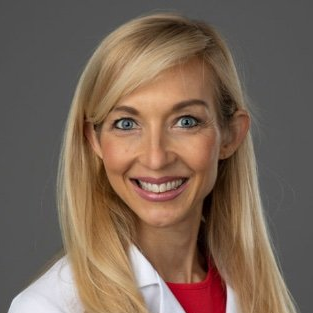WIC Interview: Brittany Weber, MD, PhD, FACC


Samip Sheth, MD, interviewed Brittany Weber, MD, PhD, FACC, the director of the cardio-rheumatology clinic at the Brigham and Women's Hospital, Harvard Medical School, in Boston, MA.
How did you develop an interest in medicine?
My initial interest in medicine began in high school in Oklahoma, where I was born and raised. I was awarded the Fleming Scholarship by the Oklahoma Medical Regional Foundation the summer after high school graduation. This provided an opportunity to do research in a lab focused on lupus the summer before I started college.
Prior to this experience, I had no exposure to medicine. As a first-generation student from a small country town without even a stoplight back then, thought I was going to be a journalist; until I fell in love with the lab.
My summer in the research lab was life-altering. I changed my college major and continued in the lab, where I spent four years studying B-cell dysfunction in lupus. Through my mentors, I learned what a physician scientist does and my career trajectory changed. I chose the University of Pennsylvania for the MD/PhD Training Program and during the PhD portion, I ended up in a lab studying T-cell development.
How did you develop an interest in cardiology?
After my PhD, I returned to medical school and fell in love with cardiology; both the physiology and taking care of the patients. As I gravitated towards cardiology, I began to think through how I would integrate my two passions: immunology and cardiology. At the time, I was planning to focus on heart transplantation from the perspective of a transplant immunologist.
I was thrilled I matched at the Brigham and Women's Hospital where I did a full three-year residency, including serving as a chief of internal medicine, and a cardiology fellowship.
It was during my chief year when I had that 'light bulb' moment of how I was going to integrate my passions: cardio-rheumatology. I vividly remember presenting a patient with rheumatoid vasculitis and knew I wanted to figure out how to combine these two fields. My cardiology training sparked an interest in cardiovascular imaging, and I sought out mentorship in how I could explore the intersection of cardiology and rheumatology and utilize imaging to mechanistically address cardiovascular risk in rheumatologic disease conditions, which is now ongoing.
Do you have any advice for trainees?
Mentorship is critical and one of the most important aspects of our training process. Spend time finding your mentors. The route to being a physician scientist may feel like a long and hard path, but it is an enormous privilege. For me, it all comes back to the patients. When I come in on Monday to see a full day of patients in the cardio-rheumatology clinic, I look forward to understanding each patient's unique journey. At a fundamental level, I strive to try to improve the quality of their lives and help them survive. The key for all trainees embarking on this incredible pathway in cardiology is to not give up, stay motivated and continue to find your passion. The path is not linear, so spend time finding mentors to help you reach your goals.

This article was authored by Samip Sheth, MD, a medical dermatology resident in the University of Minnesota combined program in Minneapolis, MN.
This content was developed independently from the content developed for ACC.org. This content was not reviewed by the American College of Cardiology (ACC) for medical accuracy and the content is provided on an "as is" basis. Inclusion on ACC.org does not constitute a guarantee or endorsement by the ACC and ACC makes no warranty that the content is accurate, complete or error-free. The content is not a substitute for personalized medical advice and is not intended to be used as the sole basis for making individualized medical or health-related decisions. Statements or opinions expressed in this content reflect the views of the authors and do not reflect the official policy of ACC.